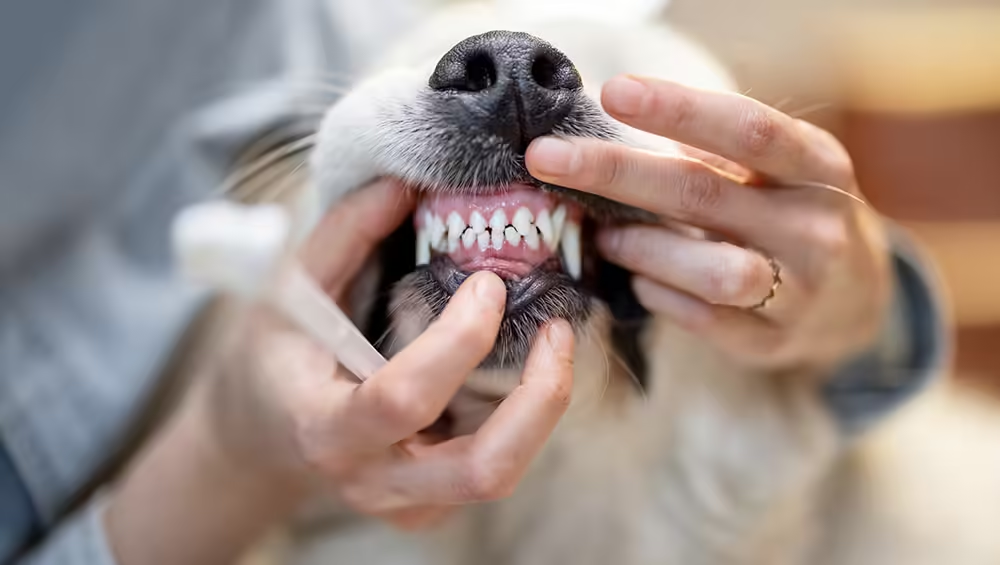COD Available , FREE SHIPPING

Dental health is such an important part of your pet’s overall wellbeing. But a lot of times it tends to get overlooked. Take responsible pet parenting to the next level by taking care of your pet’s teeth and dental issues. Proper dental care involves preventive measures like brushing your pet’s teeth. But always remember to use pet toothpaste only for your furry friends.
Read on to find out some of the most common dental problems in dogs.
Bacterial infection in the tissues surrounding the teeth can cause inflammation to the gums, ligaments that hold the teeth, and the jaw bone. If gum (periodontal) disease goes untreated, teeth can be lost due to the loss of their supporting tissues. The two most common gum diseases in canines are – gingivitis and periodontis.
In gingivitis, there is inflammation in gums due to plaque, but the ligaments and the bone are not affected. The gums change color from a healthy flesh-pink to reddish purple. In periodontitis, the tissue damage is more severe and includes the gums, ligaments, and bone. It usually is seen after years of development of plaque, tartar, and gingivitis.
Endodontic diseases occur inside the tooth/ teeth. The causes can be – enamel erosion, injury, tooth decay, tooth fracture etc. Your pet’s teeth can be fractured due to an external injury or accident, or by biting something really hard.
Tooth decay and cavities is quite uncommon in dogs as compared to humans. When tooth decay occurs, it s visible as pits on the bite surface of the molars. If your pet has cavities, you can talk to your vet and get them filled to prevent further damage.
There are several developmental abnormalities that can affect your pooch and the most common ones are –
Unerupted teeth
Certain small breeds are more prone to their teeth not erupting properly. Usually Breeds that have a shortened, flattened head can have teeth not erupting properly in the correct position. Any unerupted teeth causing a problem should be extracted. Dogs that have any unerupted teeth should be spayed or neutered so that the condition is not passed to offspring.
Enamel defects
During the development stage when tooth enamel is deposited on baby and permanent teeth, factors like infections, fever etc. can lead to developmental abnormalities. The canine distemper virus is especially damaging because it both attacks the enamel-producing cells of the teeth and causes a fever. Severe malnutrition in young dogs may also result in enamel defects.
Trust your vet for the best diagnosis and treatment. And your role is to take your pet to the vet if you notice anything unusual. Early detection and treatment can prevent the situation from worsening.
Keep your pooch healthy and happy with the good gut guide Digestive health is such an important part of your pet’s overall health. But in certain cases pet-parents don’t pay attention to their pet’s proper nutrition which can cause long term health issues. It is true that health starts from within, so today we discuss […]
Vital vitamins for your furry friends The debate of building our immunity, especially during these times and getting a nutritious and healthy diet is never-ending. But are you forgetting the nutrition of your pets? If so, then it is time to rethink nutrition and learn the importance of vitamins for your pets. The right balance […]
Skin science is no rocket science! Skin is the largest organ of your pooch’s body, yet sometimes its health and wellness tends to get overlooked. You invest so much in your skincare and give your skincare sessions a lot of time and patience. Your pet also deserves the same. Skincare needs time and patience. A […]
TrueTumz is a brand of Prisaach Pet Solutions Pvt Ltd. – a pet care company dedicated to creating services and solutions keeping the dog at the center of everything. We put dogs first and that reflects in every decision we take w.r.t products and services.
Copyright © 2026 TrueTumz. All Rights Reserved